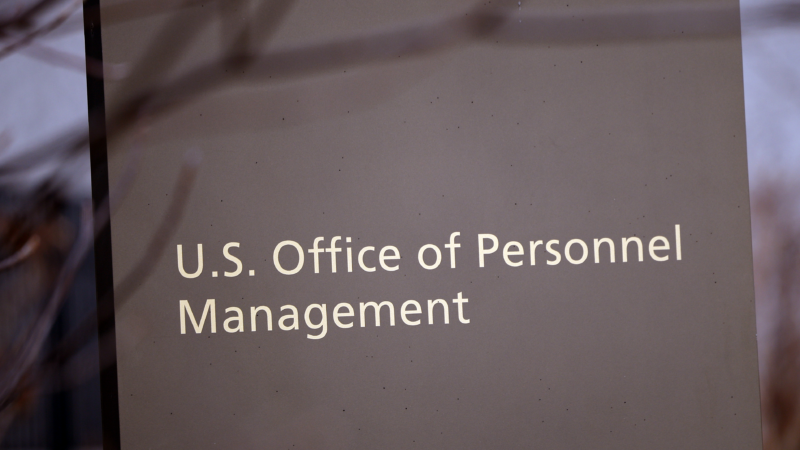OPM alters memo about probationary employees but does not order mass firings reversed
The Trump administration has revised a Jan. 20 memo asking federal agencies to provide a list of all probationary employees to the Office of Personnel Management, adding a disclaimer that OPM is not directing agencies to take any specific action.
But the memo doesn’t call for a reinstatement of the tens of thousands of probationary employees who have been fired. Probationary employees are typically in their first or second year on the job.
A new paragraph in the revised memo updated Tuesday merely states “Please note that, by this memorandum, OPM is not directing agencies to take any specific performance-based actions regarding probationary employees. Agencies have ultimate decision-making authority over, and responsibility for, such personnel actions.”
On Tuesday afternoon, the American Federation of Government Employees, a union representing 800,000 civil servants, called on agencies to act anyway.
“Every agency should immediately rescind these unlawful terminations and reinstate everyone who was illegally fired,” wrote AFGE National President Everett Kelley in a statement.
Judge had ruled probationary firings likely violated multiple statutes
OPM issued the revised memo in part to provide clarity in light of a recent court order, an agency spokesperson confirmed, referring to last week’s ruling from a federal judge in San Francisco.
U.S. District Judge William Alsup ruled that OPM had likely violated multiple statutes in ordering agencies to carry out the firings and ordered OPM to rescind the Jan. 20 memo, along with another issued Feb. 14 that asked agencies to terminate probationary employees by Feb. 17.
“No statute — anywhere, ever — has granted OPM the authority to direct the termination of employees in other agencies,” Alsup wrote in his memorandum opinion.
In court last week, the Trump administration’s attorney argued that OPM had merely asked agencies to carry out the firings.
“Asking is not ordering,” Assistant U.S. Attorney Kelsey Helland argued.
Alsup was unconvinced, concluding at the end of the hearing that OPM had in fact ordered agencies to fire probationary employees, an act that he said was “illegal and should be stopped.”
The National Science Foundation confirmed Monday that it had reinstated with back pay all 86 probationary employees it had fired “based on updated guidance from OPM and the Federal Courts.”
OPM inserts new language about how performance is to be measured
Another modification to the Jan. 20 memo seeks to recast how probationary periods should be used.
The original Jan. 20 memo reads: “Probationary periods are an essential tool for agencies to assess employee performance and manage staffing levels.”
The March 4 revision reads: “Probationary periods are an essential tool for agencies to assess employee performance and ensure that ‘a probationer’s conduct and performance have established that the individual will be an asset to the Government.'”
The new language echoes guidance that OPM issued in that same Feb. 14 memo, instructing agencies on how they should measure probationary employees’ performance when deciding whether they should be retained.
“An employee’s performance must be viewed through the current needs and best interest of the government, in light of the President’s directive to dramatically reduce the size of the federal workforce,” the memo reads.
In their lawsuit challenging the firings, the plaintiffs said that guidance “has no basis in law,” writing “Neither OPM nor any agency may lawfully terminate a probationary employee based on performance for reasons that have nothing to do with the employee’s performance.”
Alsup has scheduled another hearing in the case on March 13.
Have information you want to share about ongoing changes across the federal government? NPR’s Andrea Hsu can be contacted through encrypted communications on Signal at andreahsu.08.
Alabama regulators approve two-year electric rate freeze and two solar projects for a Meta data center
Critics say the rate freeze will only delay financial burdens on Alabama Power customers while preserving a high profit rate for the utility.
Auburn tabs USF’s Alex Golesh as its next coach, replacing Hugh Freeze on the Plains
The 41-year-old Golesh, who was born in Russia and moved to the United State at age 7, is signing a six-year contract that averages more than $7 million annually to replace Hugh Freeze. Freeze was fired in early November after failing to fix Auburn’s offensive issues in three seasons on the Plains.
Alabama Power seeks to delay rate hike for new gas plant amid outcry
The state’s largest utility has proposed delaying the rate increase from its purchase of a $622 million natural gas plant until 2028.
Former U.S. Sen. Doug Jones announces run for Alabama governor
Jones announced his campaign Monday afternoon, hours after filing campaign paperwork with the Secretary of State's Office. His gubernatorial bid could set up a rematch with U.S. Sen. Tommy Tuberville, the Republican who defeated Jones in 2020 and is now running for governor.
Scorching Saturdays: The rising heat threat inside football stadiums
Excessive heat and more frequent medical incidents in Southern college football stadiums could be a warning sign for universities across the country.
The Gulf States Newsroom is hiring an Audio Editor
The Gulf States Newsroom is hiring an Audio Editor to join our award-winning team covering important regional stories across Mississippi, Alabama and Louisiana.









